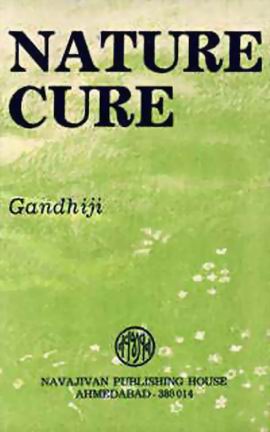Gandhi and the Ecological Vision of Life: Thinking Beyond Deep Ecology
by Vinay Lal

Cover art courtesy vedicbooks.net
In a lecture given in 1993, the Indian historian Ramachandra Guha proposed to inquire whether Gandhi could be considered an “early environmentalist”. (1) Gandhi’s voluminous writings are littered with remarks on man’s exploitation of nature, and his views about the excesses of materialism and industrial civilization, of which he was a vociferous critic, can reasonably be inferred from his famous pronouncement that the earth has enough to satisfy everyone’s needs but not everyone’s greed. Still, when ‘nature’ is viewed in the conventional sense, Gandhi was rather remarkably reticent on the relationship of humans to their external environment. His name is associated with innumerable political movements of defiance against British rule as well as social reform campaigns, but it is striking that he never explicitly initiated an environmental movement, nor does the word ‘ecology’ appear in his writings. Again, though commercial forestry had commenced well before Gandhi’s time, and the depletion of Indian forests would persistently provoke peasant resistance, Gandhi himself was never associated with forest satyagrahas, however much peasants and rebels invoked his name.
Guha also observes that, “the wilderness had no attraction for Gandhi.” (2) His writings are singularly devoid of any celebration of untamed nature or rejoicing at the chance sighting of a wondrous waterfall or an imposing Himalayan peak; and indeed his autobiography remains utterly silent on his experience of the ocean, over which he took an unusually long number of journeys for an Indian of his time. In Gandhi’s innumerable trips to Indian villages and the countryside — and seldom had any Indian acquired so intimate a familiarity with the smell of the earth and the feel of the soil across a vast land — he almost never had occasion to take note of the trees, vegetation, landscape, or animals. He was by no means indifferent to animals, but he could only comprehend them in a domestic capacity. Students of Gandhi certainly are aware not only of the goat that he kept by his side and of his passionate commitment to cow-protection, but of his profound attachment to what he often described as ‘dumb creation’, indeed to all living forms.
Read the pdf of the complete article by clicking here: Gandhi and the Ecological Vision
EDITOR’S NOTE: Vinay Lal is Professor of History and Asian American Studies at UCLA. He writes widely on the history and culture of colonial and modern India, popular and public culture in India (especially cinema), historiography, the politics of world history, the Indian diaspora, global politics, contemporary American politics, and the life and thought of Mohandas Gandhi. He is the author or editor of over fifteen books. His exceptional blog site gives a full biography, and list of his publications. It is regularly updated with a wealth of articles on India and Gandhi.




